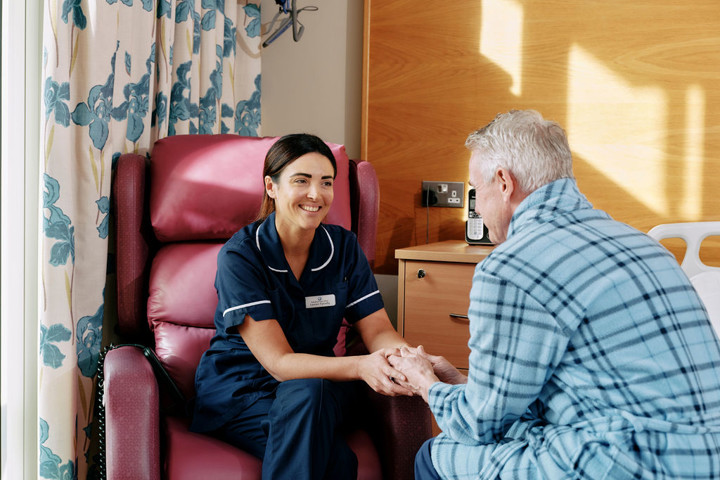
Care at Hospice
At times, you may need round the clock care that can be provided on the In Patient Unit.
Wednesday 29 May 2024
We recently had the pleasure of chatting to Simon Boas, Executive Director of Jersey Overseas Aid and a patient currently under our care. Following a terminal cancer diagnosis in February, Simon has been making headlines with his regular newsletter called 'A Beginner's Guide To Dying' where he shares his thoughts on life and death.
We asked Simon for his opinion on some of the common myths that surround hospices as well as sharing his experiences with the care he has received.
Hospice - busting some myths!
I’ve been under the care of the wonderful team at Jersey Hospice Care for a couple of months now (and hopefully will be for a couple more too!). However, I sometimes get mixed reactions when I tell people that, so I thought it would be good to try to set a few things straight about what Hospice does, and what Hospice is like for a patient.
Myth 1: Hospice is where you go to die
I do have a terminal prognosis, but I’m still a little way off joining the choir invisible. In fact, what the amazing palliative care team has done is help me to continue leading the life I want to live. They’ve controlled my pain and other symptoms so I can keep working a bit, keep spending quality time with those I love, even keep having the odd glass of muscadet in the sun at home! They’ve kept me OUT of hospital several times. They’re totally on my side: they understand my priorities, and they focus on ME, not solely on my disease.
Myth 2: Hospice is a gloomy place
I have rarely laughed so much as during consultations with my palliative care team at Hospice. But there is also a profound understanding of what my emotional, mental and even spiritual needs might be. I don’t know whether hospices are just really good at recruiting sunny, compassionate employees or whether working there nourishes those qualities, but the staff are the least gloomy people you will meet. And so are the other patients! We’re all in it together, and there is a lovely sense of warmth and humanity and good humour in the communal areas. And if you need to be admitted for a bit (many stay for a few nights as part of their care, but actually for most that’s not the end) the rooms are awesome. A garden and a view that you’d have to be a millionaire to pay for! And people and pets can visit whenever. It’s really a home from home.
Myth 3: Hospice only cares for people with cancer
I do have cancer (the Full English now), but almost half of those being treated at Hospice don’t. Many have things like liver, lung or heart disease, kidney failure or MND. Hospice makes you comfortable - in every sense of the word - whatever you’re suffering from.
Myth 4: Jersey Hospice is a religious organisation.
That’s an easy one: it’s not at all. However, as they approach the end of their lives many people - myself included - become more interested in matters of the spirit and the soul. This isn’t a clutching-at-straws, or a last punt on Pascal’s wager, but something that comes quite naturally when one can finally see Death clearly, unhidden at last from all our terrors and taboos. Jersey Hospice has a wonderful spiritual care team, who can help patients and relatives with all kinds of questions about the Last Great Unknowable. And if you do adhere to - or you’re interested in knowing more about - a particular religious tradition, they can arrange for you to meet ministers and pastoral carers in anything from Christianity to Druidism.
Myth 5: It’s a bad thing to think about death
Modern western societies have an unhealthy relationship with dying. We pretend it won’t happen, we hide it and run from it, or try to drown it out with pleasures and purchases. We medicalise it, and too often only speak about it right at the end when it has become unignorable (and even then only in frightened whispers). But dying really is as natural a part of our existence as birth and love and friendship. And thinking about it has amazing power to improve our lives.
Most of us spend far too long concerned about things which are ultimately quite trivial. We worry about status and money and the unkind thing somebody said about us at work. We get really cross about the bloody potholes, or politics, or the neighbour’s new fence. We squabble and fall out with friends and loved-ones. Worse, we get trapped in jobs we hate or relationships from which love has disappeared. Death puts all of this into perspective.
Your existence is a precious gift, and you are the embodiment of series of unbelievably-unlikely coincidences that enabled our Goldilocks blue planet to form (neither too hot nor too cold), for it to teem with this wondrous inexplicable thing called life, and for you yourself to exist when just a tiny change would have meant that sperm never met that egg. And, as it must be for us to be truly human, all of this is finite. Realising this early on helps us appreciate our good fortune in living at all, and I think it can also make us more compassionate towards others, all of whom are in the same boat.
We need to talk about death more, prepare for it, and accept it. Hospices are experts in it, and they need to be living, breathing parts of our communities, like libraries and sports clubs and places of worship. Demystifying death and welcoming it into our lives helps us meet it with equanimity when it comes, but also helps us lead more meaningful, joyful lives, however much sand actually remains in our hourglasses.